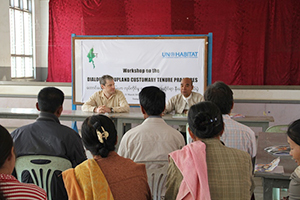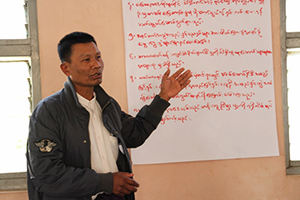Background and Objectives
Background

Myanmar is at a historic crossroads that began with the promulgation of a new constitution in 2008 followed by elections in 2010 and 2012. In March 2012, Myanmar’s parliament passed two laws that grant farmers the right to sell/pawn/lease/exchange land whereas before they had only the right to work the land with government permission. With as much as two-thirds of the population relying on agriculture for their livelihoods, the laws will be elemental to efforts to alleviate poverty and promote inclusive and sustainable development in the country. The laws are controversial both within Myanmar and among external Myanmar observers, but most agree that it is not as much the text of the new laws, but rather the way they are implemented that will determine whether they will contribute to the alleviation of poverty and the promotion of inclusive and sustainable development.
As 33-35% of the rural population is landless and many more have tenure that is not secure, access to land and tenure security are key challenges to ensure the country’s food security and overall socio-economic development. As the new laws promise to effectively transform State land into privately held assets, clear demarcation of land takes on ever greater importance in the new legal regime.
Objectives
The purpose of the Land Administration and Management Programme (LAMP) is to strengthen land administration and management by testing new processes and technologies at rural and urban pilot sites. Successful pilot processes can be replicated and scaled up in other townships.
Activities

- • Development of practical, reliable and affordable systems
- • Simultaneously building new skills of SLRD staff, improving delivery of land services and giving confidence to Government and stakeholders to continue the roll-out of new land related technology throughout the country
Results
Benefits to people in pilot townships
- • Farm land holdings recognized with the issuance of the land use certificate at low cost.
- • Information and education of the public on land laws and documents.
- • All land holdings shown up to date on accurate maps.
- • A modern and fast service for registering changes in land transactions such as inheritance, sale, mortgage.
- • Transparent process for adjudicating disputes on land.
Benefits to Settlements and Land Records Department (SLRD)
- • New systems and processes: a new lands registration systems for managing the records related to the issuance of land use certificates and to the transactions on these titles would be developed, together with the processes for computerizing the Cadastral (Kwin) maps and keeping them up to date. These software systems will be handed over to SLRD for future development and replication.
- • New technology: modern technology suitable for land administration functions will include: GIS workstations; servers and database management systems; GPS survey receivers and data processing equipment; map size scanners and plotters; document scanners and printers. SLRD will assess the impact on efficiency and reliability of these new technologies.
- • Strengthening of the SLRD Training Centre: the full set of equipment for operations at each township will also be provided for the training center so that training courses will be fully compatible with operational systems.
- • A long term development plan for land administration across the country: the knowledge and experience in LAMP will prepare the leaders of SLRD together with stakeholders to be able to accelerate the modernization of all SLRD offices across the country.
Development Partners / Partners
Development Partner: LIFT (Livelihood and Food Security Trust Fund)
Partner: Settlements and Land Records Department (SLRD)
- The Project for Emergency Support to Poor and Vulnerable Communities in Ethnic Areas
- A Short Step from Improved WASH to Healthier Communities
- The Programme for Emergency Assistance to Poor and Vulnerable Community in Ethnic Minority Areas and Yangon
- Safe and Sustainable Access to WASH for Rural Communities
- Shelter Recovery Programme – Post Giri Affected Areas
- Shae Thot ‘The Way Forward’
- Land Administration and Management Programme (LAMP) in Myanmar
- Safer Coastal and Urban Communities through DRR in Myanmar
- Disaster Risk Reduction for Safe & Resilient Burmese Coastal Communities
- The Programme for Development and Rehabilitation of Community in Ethnic Minority Area, Myanmar
- Myanmar Climate Change Alliance (MCCA)
- Rebuilding Homes-Rebuilding Lives – Coastal Settlements Sustainable Recovery (CSSR)
- Rebuilding Homes-Rebuilding Lives – Coastal Settlements Support Programme (CSSP)
- Coastal Communities Livelihood Assistance Programme (CLAP)
- Disaster Response & Preparedness – Resilient Coastal Communities and Urban Risk (DRP-CURB)
- Shelter Improvement and Disaster Risk Reduction Project
- Community Water Supply and Sanitation Recovery
- Community Based Disaster Risk Reduction (CBDRR)
- Support to the Coordination of Early Recovery Shelter Interventions-Shelter Cluster Lead
- Semi-permanent Schools in Ayeyarwady Delta in Myanmar / Multi-purpose Schools in Ayeyarwady Delta in Myanmar






































